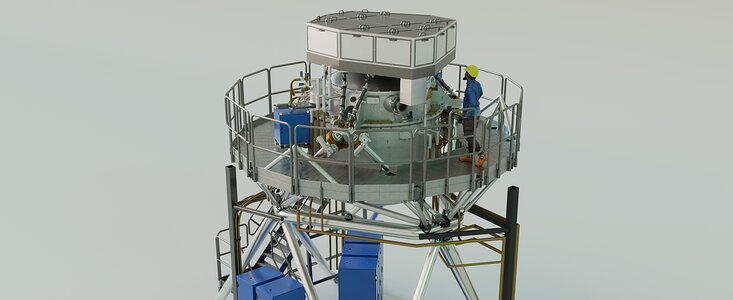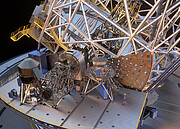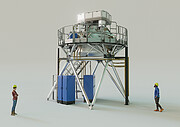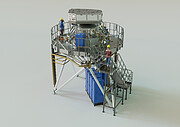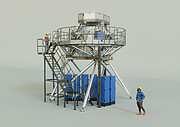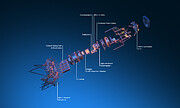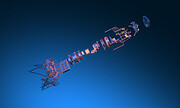Meddelande
Slutliga designen av METIS-instrumentet för ELT klar
14 maj 2024
Den slutliga designgenomgången för METIS-instrumentet, Mid-infrared ELT Imager and Spectrograph, är klar och ESO ger nu klartecken för tillverkningen av alla dess komponenter. METIS är ett sofistikerat multifunktionsinstrument för ESO:s kommande Extremely Large Telescope (ELT). Det är också det första av ELT-instrumenten som formellt avslutar Final Design Review, ett viktigt steg för METIS-konsortiet, ELT-projektet och instrumenttillverkarna.
METIS är ett första generationens instrument för “världens största öga på himlen”, ELT, vilket innebär att det kommer att börja användas när teleskopet självt tas i bruk. Det har en bred palett av vetenskapliga mål, från solsystemets utvecklingshistoria till galaxernas centrum, såväl som deras gåtfulla supermassiva svarta hål. Det huvudsakliga vetenskapliga fokuset för METIS är studier av planetbildande skivor och nyligen bildade – såväl som närliggande – exoplaneter.
Designprocessen är ett steg på resan från koncept till slutligt instrument, en process som tar flera år att färdigställa för så stora, komplexa och tekniskt avancerade instrument som detta. METIS passerade sin första designmilstolpe vid den preliminära designgranskningen 2020, och i slutet av 2022 slutfördes designen av de viktigaste instrumentkomponenterna. I och med det officiella slutförandet av METIS Final Design Review kan konsortiet nu påbörja tillverkningen av alla dess komponenter. Denna genomgång markerar den spännande övergången från beskrivning i tekniska dokument till konstruktion, montering och testning.
METIS är designad för att observera i mellaninfraröda våglängder, vilket gör den idealisk för att studera kalla eller stofthöljda objekt. Varma objekt med temperaturer av tusentals grader, som vår sol, avger mestadels synligt ljus, medan kallare objekt som planeter och stoftmoln huvudsakligen sänder ut sin strålning i infrarött. Genom att analysera ljus i detta frekvensområde kommer METIS att studera hur stjärnor och planeter bildas i stoft- och gasmoln, och tränga genom stoftet i galaxernas centrum för att studera deras supermassiva svarta hål. Dessutom förväntas METIS ge spännande bidrag till exoplanetforskningen genom att observera små, steniga exoplaneter och undersöka atmosfärernas temperatur, väder och kemiska sammansättning i sökandet efter världar med potentiella livsmöjligheter.
METIS är ett kraftfullt instrument med tre delar. Det har en kamera för att ta bilder av himlen, en spektrograf för att dela upp ljuset i dess komponentfärger eller våglängder, och en egen adaptiv optikmodul för att korrigera den störande turbulensen i atmosfären tillsammans med ELT:s adaptiva teleskopspeglar. Hela instrumentet kommer att vara inkapslat i en kryostat som håller instrumentet vid en temperatur av högst –230 grader Celsius för att förhindra att dess egen värme ska störa de infraröda mätningarna.
För att lära dig mer om METIS och dess teknik, vetenskap och de som arbetar med instrumentet, se "Möt METIS, ett multifunktionellt instrument för ELT”.
Mer information
METIS-konsortiet utgörs av NOVA (Netherlands Research School for Astronomy representerat av Leidens Universitet, Nederländerna), Max Planck Institute for Astronomy (MPIA, Heidelberg, Tyskland), University of Cologne (Tyskland), UK Astronomy Technology Centre (UKATC, Edinburgh, Skotland, Storbritannien), KU Leuven (Belgien), Paris Saclay research center of the CEA (French Alternative Energies and Atomic Energy Commission, Frankrike), Center for Astrophysics and Gravitation (CENTRA, University of Lisbon, Portugal), ETH Zürich (Switzerland), A* (ett österrikiskt samarbete representerat av University of Vienna, University of Innsbruck, University of Graz, University of Linz och RICAM Linz, Austrian Academy of Sciences, Österrike), University of Michigan at Ann Arbor (United States), Academia Sinica Institute of Astronomy and Astrophysics in Taipei (Taiwan) och Université de Liège (Belgien), med bidrag från ESO.
Länkar
Om meddelandet
| ID: | ann24007 |
Our use of Cookies
We use cookies that are essential for accessing our websites and using our services. We also use cookies to analyse, measure and improve our websites’ performance, to enable content sharing via social media and to display media content hosted on third-party platforms.
ESO Cookies Policy
The European Organisation for Astronomical Research in the Southern Hemisphere (ESO) is the pre-eminent intergovernmental science and technology organisation in astronomy. It carries out an ambitious programme focused on the design, construction and operation of powerful ground-based observing facilities for astronomy.
This Cookies Policy is intended to provide clarity by outlining the cookies used on the ESO public websites, their functions, the options you have for controlling them, and the ways you can contact us for additional details.
What are cookies?
Cookies are small pieces of data stored on your device by websites you visit. They serve various purposes, such as remembering login credentials and preferences and enhance your browsing experience.
Categories of cookies we use
Essential cookies (always active): These cookies are strictly necessary for the proper functioning of our website. Without these cookies, the website cannot operate correctly, and certain services, such as logging in or accessing secure areas, may not be available; because they are essential for the website’s operation, they cannot be disabled.
Functional Cookies: These cookies enhance your browsing experience by enabling additional features and personalization, such as remembering your preferences and settings. While not strictly necessary for the website to function, they improve usability and convenience; these cookies are only placed if you provide your consent.
Analytics cookies: These cookies collect information about how visitors interact with our website, such as which pages are visited most often and how users navigate the site. This data helps us improve website performance, optimize content, and enhance the user experience; these cookies are only placed if you provide your consent. We use the following analytics cookies.
Matomo Cookies:
This website uses Matomo (formerly Piwik), an open source software which enables the statistical analysis of website visits. Matomo uses cookies (text files) which are saved on your computer and which allow us to analyze how you use our website. The website user information generated by the cookies will only be saved on the servers of our IT Department. We use this information to analyze www.eso.org visits and to prepare reports on website activities. These data will not be disclosed to third parties.
On behalf of ESO, Matomo will use this information for the purpose of evaluating your use of the website, compiling reports on website activity and providing other services relating to website activity and internet usage.
Matomo cookies settings:
Additional Third-party cookies on ESO websites: some of our pages display content from external providers, e.g. YouTube.
Such third-party services are outside of ESO control and may, at any time, change their terms of service, use of cookies, etc.
YouTube: Some videos on the ESO website are embedded from ESO’s official YouTube channel. We have enabled YouTube’s privacy-enhanced mode, meaning that no cookies are set unless the user actively clicks on the video to play it. Additionally, in this mode, YouTube does not store any personally identifiable cookie data for embedded video playbacks. For more details, please refer to YouTube’s embedding videos information page.
Cookies can also be classified based on the following elements.
Regarding the domain, there are:
- First-party cookies, set by the website you are currently visiting. They are stored by the same domain that you are browsing and are used to enhance your experience on that site;
- Third-party cookies, set by a domain other than the one you are currently visiting.
As for their duration, cookies can be:
- Browser-session cookies, which are deleted when the user closes the browser;
- Stored cookies, which stay on the user's device for a predetermined period of time.
How to manage cookies
Cookie settings: You can modify your cookie choices for the ESO webpages at any time by clicking on the link Cookie settings at the bottom of any page.
In your browser: If you wish to delete cookies or instruct your browser to delete or block cookies by default, please visit the help pages of your browser:
Please be aware that if you delete or decline cookies, certain functionalities of our website may be not be available and your browsing experience may be affected.
You can set most browsers to prevent any cookies being placed on your device, but you may then have to manually adjust some preferences every time you visit a site/page. And some services and functionalities may not work properly at all (e.g. profile logging-in, shop check out).
Updates to the ESO Cookies Policy
The ESO Cookies Policy may be subject to future updates, which will be made available on this page.
Additional information
For any queries related to cookies, please contact: pdprATesoDOTorg.
As ESO public webpages are managed by our Department of Communication, your questions will be dealt with the support of the said Department.
